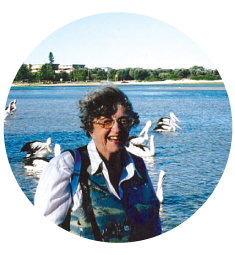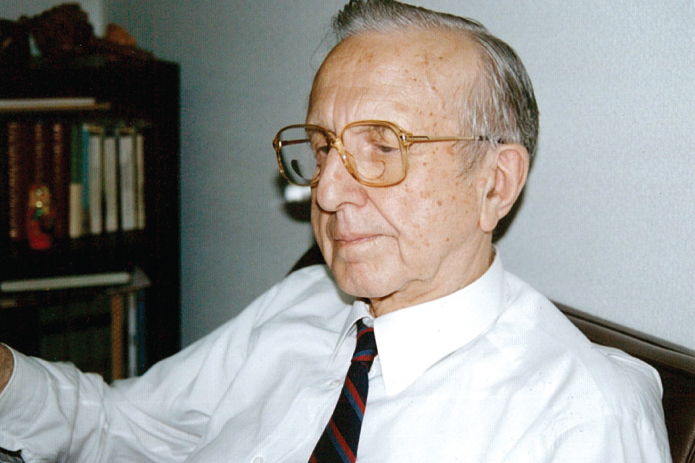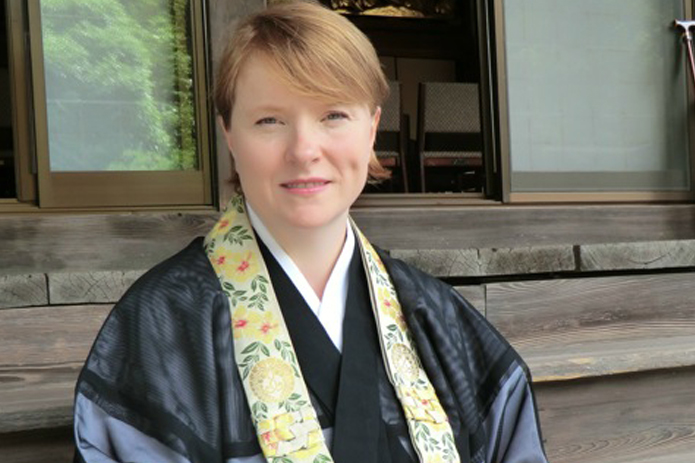
Doreen Simmons
After 38 years in Japan, this 80-year-old still keeps busy with politics, media, sumo, drums and choir
“I never intended to get this busy, it just seemed to happen. I’ve got four main jobs at the moment”, said Doreen Simmons, who turned 80 in May but shows no sign of slowing down after 38 years in Japan.
As well as her main job at the Foreign Press Center, Simmons also works at the House of Councillors and the House of Representatives, as well as the National Diet Library, checking English-language materials and occasionally helping negotiations with overseas entities.
Asked about her work for NHK, through which she has been the “voice of sumo” in English for decades, she replied: “That doesn’t count as one of my main jobs; it’s just a side-line. I also did a fair amount of voiceover work, but don’t really have the time [now], since I got busier over the last few years”.
The advantages of working part-time at so many endeavours include getting around the requirement of Japanese citizenship for employment at government-related jobs, and that the mandatory retirement age doesn’t apply, she explains.
“I’d like to get permanent residence though, so I can’t be deported if I can’t work”.
Having spent much of the 1960s teaching at a British Army school in Singapore, Simmons found herself on a farm in rural Japan during a three-month trip to the country towards the end of the decade. It was there she first caught the sumo bug.
“It was March, the time of the Osaka Basho, and the farmer had the biggest television available at the time, and colour too—they only had black and white in Singapore then. I was interested in sumo anyway, as I’ve always been fascinated by the past and with survival stories”, she recalled.
Sumo was one of the many things that attracted her to Japan and so, after a stint teaching classics back in England, during which time she tried out for the pilot programme of the BBC’s “Mastermind” and was a contestant in the first series, coming second in her heat, she returned to the country that was to become her new home.
“I realised that I was meant to be overseas British, where every day is a challenge and you have to be alert, always experiencing new things and solving problems”, Simmons explained.
On her return to Tokyo in 1973, five years after her first visit, she saw the beginnings of the city’s high-rise future protruding into the sky.
“Because of the planning laws, the tallest buildings had been eight storeys high. When I came back there were four tall buildings, one in Kasumigaseki and three in Shinjuku. I found out, years later, that the laws had been changed, and that was the start of it all”.
As for the other numerous and dramatic changes that have occurred in Japan in the nearly four decades since, Simmons says she is too close to them to have fully taken in many of them. “It’s like children; you don’t notice them growing up when you’re next to them all the time”.
Having become something of a fixture in the sumo world and living in Ryogoku, where many of Tokyo’s stables are located, she has numerous friendships with wrestlers, judges and other senior figures in the male-dominated world. She believes sumo will recover from its recent troubles of bout-fixing, bullying and underworld-related gambling. “There have always been ups and downs”, she says.
The performing arts are her other great love and she breaks into a rendition of Oh My Darling, Clementine in Latin, while recalling her teaching days.
“I’ve done bits of acting all me life”, said Simmons, her Nottingham twang coming through despite her classics and theology education at Girton College, Cambridge. “I decided about three years ago, though, that appearing in plays was just too much of a strain, what with all the rehearsing and memorising lines. I still sing, though, and am active in the British Embassy Choir”.
“I’m also a bodhran (Irish drum) player and percussionist”, said Simmons, who in most weeks plays at Irish pubs around Tokyo.
Simmons took up the djembe west African drum about a decade ago, after finding a shop in Asakusa that gave lessons on how to play the instrument. She now makes the occasional appearance playing it and accompanying other musicians.
Looking towards her ninth decade, her schedule would still terrify most people less than half her age.


